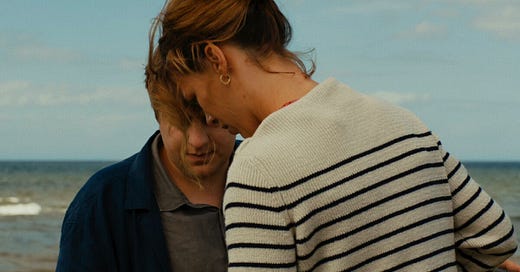WARNING: If my last post on Blue Planet was too wellness-coded for your taste, then you shouldn’t read my take on Christian Petzold’s Afire.
I’ve been struggling with bouts of intense anxiety/panic throughout the last couple of weeks. I don’t do well with idle time, and with the strike entering it’s 2,423 month, my brain has had me spinning out (and not doing much else). I’ve tried all sorts of mindfulness exercises, and fortunately the edge has started to fade away.
As anyone who’s struggles with anxiety knows, the more you can ground yourself in your body, in your present space and time, the better you will feel.
—
I was at wedding last February, and there was a moment where, at the party amongst dancing friends and family, I felt very disconnected. I walked off and sat alone on a bench. I punished myself for perpetually being the observer, for being in my head, for not being able to experience the joy and excitement of the evening. I turned bitter and, in way, selfish for having such tunnel vision at an event that had little to do with me. I couldn’t see anything but my own thoughts and feelings.
Eventually, I drank some alcohol, lost track of my mind, and was able to join the masses in the celebration. Afire, another great film from one of our greatest working directors, poses this question: what does one miss when consumed by their own narrativizing?
—
Leon is a writer (probably in his late 20s or early 30s) who is invited by his friend Felix, who is applying to art school, to Felix’s family home on the German Baltic coast for the summer. He’s immediately tense, preoccupied with his new novel, and the weight of his discomfort — with himself, with those around him — make him stubborn at best and cruel at worst.
At Felix’s home, they learn that Felix’s mother let the daughter of a friend from work crash at the place. They arrive to half eaten lasagna, dishes aplenty, and realize they must spend the night in a tiny room together. The woman brings a lover over, and Leon is miserable when their loud sex keeps him from sleeping. Felix is unbothered by it all, but Leon is enraged. He can’t sleep. He can’t write. And when he finally meets this woman, Nadja, who he immediately is drawn to, he can’t even express any sort of kindness or interest towards her.
He’s consumed by own bitterness and, to his credit, commits to the bit of being the misanthropic, overly analytical writer who has no time for anything but his own whims. And Petzold leans into this hard, by presenting Leon as guy who won’t take his shirt off at the beach, who will poke hard at the most attractive guy in the group, and by playing a foggy and hypnotic tune aptly called “In My Mind” over and over again.
Without going too much into the plot of the movie, it’s important to note that surrounding this idyllic vacation home, shot with a clear nod to Rohmer’s summer vibes, are looming wild fires. The group, which eventually includes Nadja’s lover Devid, are naturally concerned about the state of the world, of a fire that may or may not be headed in their direction, but Leon remains unaffected. He’s uptight and self-obsessed, and is so deep in his own head, he’s unable to see what the world is turning into. He misses social cues, like when Felix and Devid start hooking up, and constantly pushes back at Nadja when she attempts to connect.
Despite its surprising turns and darkness, Petzold’s film is a quintessential summer movie, a coming of age tale in a way. Late in the film ashes start begin to pour down onto the home, and we see Leon finally look up, as if it’s the first time he’s ever considered nature. Leon must come into awareness, escape the loops and traps of his own mind, and engage with reality.




